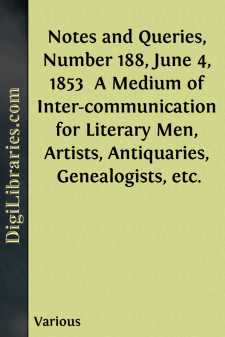Categories
- Antiques & Collectibles 13
- Architecture 36
- Art 48
- Bibles 22
- Biography & Autobiography 813
- Body, Mind & Spirit 142
- Business & Economics 28
- Children's Books 15
- Children's Fiction 12
- Computers 4
- Cooking 94
- Crafts & Hobbies 4
- Drama 346
- Education 46
- Family & Relationships 57
- Fiction 11828
- Games 19
- Gardening 17
- Health & Fitness 34
- History 1377
- House & Home 1
- Humor 147
- Juvenile Fiction 1873
- Juvenile Nonfiction 202
- Language Arts & Disciplines 88
- Law 16
- Literary Collections 686
- Literary Criticism 179
- Mathematics 13
- Medical 41
- Music 40
- Nature 179
- Non-Classifiable 1768
- Performing Arts 7
- Periodicals 1453
- Philosophy 64
- Photography 2
- Poetry 896
- Political Science 203
- Psychology 42
- Reference 154
- Religion 513
- Science 126
- Self-Help 84
- Social Science 81
- Sports & Recreation 34
- Study Aids 3
- Technology & Engineering 59
- Transportation 23
- Travel 463
- True Crime 29
Notes and Queries, Number 188, June 4, 1853 A Medium of Inter-communication for Literary Men, Artists, Antiquaries, Genealogists, etc.
by: Various
Categories:
Description:
Excerpt
NOTES ON SEVERAL MISUNDERSTOOD WORDS.
(Continued from p. 522.)
Dare, to lurk, or cause to lurk; used both transitively and intransitively. Apparently the root of dark and dearn.
"Here, quod he, it ought ynough suffice,
Five houres for to slepe upon a night:
But it were for an olde appalled wight,
As ben thise wedded men, that lie and dare,
As in a fourme sitteth a wery hare."
Tyrwhitt's utterly unwarranted adoption of Speght's interpretation is "Dare, v. Sax. to stare." The reader should always be cautious how he takes upon trust a glossarist's sly fetch to win a cheap repute for learning, and over-ride inquiry by the mysterious letters Sax. or Ang.-Sax. tacked on to his exposition of an obscure word. There is no such Saxon vocable as dare, to stare. Again, what more frequent blunder than to confound a secondary and derivative sense of a word with its radical and primary—indeed, sometimes to allow the former to usurp the precedence, and at length altogether oust the latter: hence it comes to pass, that we find dare is one while said to imply peeping and prying, another while trembling or crouching; moods and actions merely consequent or attendant upon the elementary signification of the word:
"I haue an hoby can make larkys to dare."
Skelton's Magnifycence, vol. i. p.269. l. 1358., Dyce's edition;
on which line that able, but therein mistaken editor's note is, "to dare, i. e. to be terrified, to tremble" (he however also adds, it means to lurk, to lie hid, and remits his reader to a note at p. 379., where some most pertinent examples of its true and only sense are given), to which add these next:
" · · let his grace go forward,
And dare vs with his cap, like larkes."
First Fol., Henry VIII., Act III, Sc. 2.
"Thay questun, thay quellun,
By frythun by fellun,
The dere in the dellun,
Thay droupun and daren".
The Anturs of Arthur at the Tarnewathelan,
St. IV. p. 3. Camden Society's Publications.
"She sprinkled vs with bitter juice of vncouth herbs, and strake
The awke end of hir charmed rod vpon our heades, and spake
Words to the former contrarie. The more she charm'd, the more
Arose we vpward from the ground on which we darde before."
The XIIII. Booke of Ouid's Metamorphosis,
p. 179. Arthur Golding's translation: London, 1587.
"Sothely it dareth hem weillynge this thing; that heuenes weren before," &c.
And again, a little further on:
"Forsothe yee moste dere, one thing dare you nougt (or be not unknowen): for one day anentis God as a thousande yeeris, and a thousande yeer as one day."—C 3 Petre 2., Wycliffe's translation:
in the Latin Vulgate, latet and lateat respectively; in the original, λανθá½±νει and λανθανá½³τω. Now the book is before me, I beg to furnish Mr. Collier with the references to his usage of terre, mentioned in Todd's Dictionary, but not given (Collier's Shakspeare, vol. iv. p. 65., note), namely, 6th cap. of Epistle to Ephesians, prop. init.; and 3rd of that to Colossians, prop. fin.
Die and live.—This hysteron proteron is by no means uncommon: its meaning is, of course, the same as live and die, i. e....












